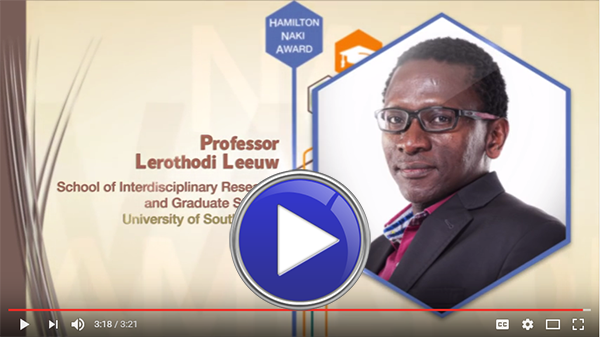At the 2016 National Research Foundation (NRF) Awards ceremony to recognise and celebrate South African research excellence, Unisa received the Excelleration Award for South African Research Institutions, while Prof Lerothodi Leeuw walked off with the Hamilton Naki Award.
Derived from the words “excellence” and “acceleration”, the Excelleration Award acknowledges Unisa for achieving the most improved research performance over recent years, measured against a selection of critical indicators.
In accepting the award, Prof Mandla Makhanya, Unisa Principal and Vice-Chancellor, said that the university was extremely proud of this accolade. “Given that we are not a dedicated research university, the fact that the NRF has seen fit to award the 2016 Excelleration Award for South African Research Institutions to Unisa speaks in no small measure to the innovation, commitment, and success of the institution to grow this critical aspect of scholarship. On behalf of management and Council, I’d like to express my sincere appreciation to all staff who made this award possible and who are contributing to Unisa’s growing status in the world of higher education research.”
The Hamilton Naki Award honours black scientists moving towards world-class research performance by giving them encouragement and recognition for their efforts to advance their careers in science, despite considerable equity challenges.
The 2016 recipient, Unisa’s Prof Lerothodi Lapula Leeuw, hails from the Kalahari. He is the first black South African to obtain a Bachelor of Science degree at the Massachusetts Institute of Technology (MIT) in the USA and one of only three black students from anywhere in the world to major in Physics there. He went on to obtain the MSc degree in Astronomy at UCT and his PhD degree in Astrophysics from the University of Central Lancashire in the UK.
 Leeuw conducts multi-wavelength astrophysical research on the evolution of elliptical galaxies and their progenitors, in both gravitationally lensed and un-lensed systems. The lensed systems are excellent probes of dark matter that is partially responsible for gravitational lensing, and one of the aims of the research is to assemble a large sample of gravitational lenses that can be used to probe the distribution and nature of dark matter in the Universe.
Leeuw conducts multi-wavelength astrophysical research on the evolution of elliptical galaxies and their progenitors, in both gravitationally lensed and un-lensed systems. The lensed systems are excellent probes of dark matter that is partially responsible for gravitational lensing, and one of the aims of the research is to assemble a large sample of gravitational lenses that can be used to probe the distribution and nature of dark matter in the Universe.
Speaking about the award, Leeuw said that it was named after Hamilton Naki, the legendary ‘self-taught surgeon who trained generations of medical students in surgical techniques’. “It is a huge honour to receive the award. Part celebration and reflection, it is a call to action to carry forward the legacy of Hamilton Naki in the pursuit of excellence in research, training, and community engagement,” he said.
This research exploits observations at infrared to radio and complementary wavebands obtained using ground and space telescopes, both large and small. In South Africa, the large telescopes he uses currently include the Southern African Large Telescope, SALT, and, in the future, the MeerKAT, which is part of the Square Kilometre Array (SKA). Major international collaborations include work with the Herschel-ATLAS consortium and observations with the CARMA ARRAY.
*Compiled by Sharon Farrell
Publish date: 2016-09-08 00:00:00.0